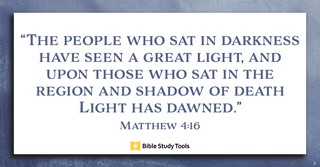- Recent Translations
- All Translations
Matthew 4:16
Share
Settings
Matthew 4:16 Meaning and Commentary
The people which sat in darkness
The inhabitants of Galilee, who sat or "walked", as in Isaiah; that is, continued in spiritual darkness, in ignorance, blindness, error, and infidelity, "saw great light"; Christ himself, who came a light into the world; he conversed with them, preached unto them, and opened the eyes of their understandings to behold his glory, and to know him, and salvation by him.
And to them which sat in the region and shadow of death:
the same persons who sit in darkness, sit also in the region of death; for such are dead in trespasses and sins: where there is no spiritual light, there is no spiritual life, and such are in danger of the second death; but the happiness of these people was, that to them "light is sprung up", like the rising sun, and this without their asking or seeking for: Christ, the sun of righteousness, arose upon them, without any desert, desire, or expectation of theirs, with healing in his wings; and cured them of their darkness and deadness, turned them from darkness to light, and caused them to pass from death to life. "Light" is not only a character under which Christ frequently goes in the New Testament, see ( John 1:4-8 John 1:9 ) ( 3:19 ) ( 8:12 ) ( 12:46 ) but is one of the names by which the Messiah was known under the Old Testament; see ( Daniel 2:22 ) ( Psalms 43:3 ) and which the Jews give unto him: says R, Aba F1 Serungia, "and the light dwelleth with him"; this is the king Messiah. The note of R. Sol. Jarchi on these words, "send forth thy light", is, the king Messiah; who is compared to light, according to ( Psalms 132:17 ) the days of the Messiah are by them said to F2 be (hrwa ymy) "days of light"; and so these Galilaeans found them to be; as all do, to whom the Gospel of Christ comes with power and demonstration of the Spirit. And these days of light first begun in the land of Zabulon which, according to Philo the Jew F3, was
``(sumbolon fwtov) , "a symbol of light"; since (adds he) its name signifies the nature of night; but, the night removing, and departing, light necessarily arises.''As did, in a spiritual sense, here, when Christ the light arose.
F1 Bereshith Rabba, fol. 1. 3. & Echa Rabbati, fol. 50. 2.
F2 Baal Hatturim in Gen. fol. 2. 2.
F3 De Somniis, p. 1113.
